So I’ve been writing this program that should take an array of pointers of a custom struct (DbRecord). My code is currently set up to hold 512 different pointers to DbRecord structs. I’ve been attempting to write a function readArray that will iterate through the pointers and print out the full contents of the DbRecords. As can be seen in the code, I am using the windows console api. The problem is I can’t figure out how to write the function, I have a picture in my mind as too the pointers as the array elements and then possibly using an offset to access the fields in the struct. One of my attempts involved a LEA to add the offset to the address of the current element, but the LEA did not behave as I expected.
Here is the code, I took out the different attempts because it was turning in too a mess:
.386
.model flat, stdcall
option casemap :none
include windows.inc
include user32.inc
include kernel32.inc
addElement PROTO: ptr DbRecord
readArray PROTO
.data?
DbRecord struct
Id dd ?
WordOne db 32 dup(?) ; db is define byte, set value of byte
WordTwo db 32 dup(?)
WordThree db 32 dup(?)
Year dd ?
DbRecord ends
array dword 512 dup(?) ; pointer in memory to start of array
; newElementPointer DbRecord <>
hStdOut dd ?
bytesWritten dd ?
.data
arrayCount dd 0
hello db 'Hello World!', 0
.code
main proc
LOCAL DbRecord01:DbRecord
LOCAL DbRecord02:DbRecord
mov [DbRecord01.Id], 1;
; any other way than one character at a time?
mov byte ptr [DbRecord01.WordOne], 'D'
mov byte ptr [DbRecord01.WordOne + 1], 'o'
mov byte ptr [DbRecord01.WordOne + 2], 'g'
mov byte ptr [DbRecord01.WordOne + 3], 0
mov byte ptr [DbRecord01.WordTwo], 'C'
mov byte ptr [DbRecord01.WordTwo + 1], 'a'
mov byte ptr [DbRecord01.WordTwo + 2], 't'
mov byte ptr [DbRecord01.WordTwo + 3], 0
mov byte ptr [DbRecord01.WordThree], 'E'
mov byte ptr [DbRecord01.WordThree + 1], 'y'
mov byte ptr [DbRecord01.WordThree + 2], 'e'
mov byte ptr [DbRecord01.WordThree + 3], 0
mov [DbRecord01.Year], 2022;
mov [DbRecord02.Id], 2;
; any other way than one character at a time?
mov byte ptr [DbRecord02.WordOne], 'c'
mov byte ptr [DbRecord02.WordOne + 1], 'a'
mov byte ptr [DbRecord02.WordOne + 2], 'r'
mov byte ptr [DbRecord02.WordOne + 3], 0
mov byte ptr [DbRecord02.WordTwo], 'H'
mov byte ptr [DbRecord02.WordTwo + 1], 'o'
mov byte ptr [DbRecord02.WordTwo + 2], 'u'
mov byte ptr [DbRecord02.WordTwo + 3], 's'
mov byte ptr [DbRecord02.WordTwo + 3], 'e'
mov byte ptr [DbRecord02.WordTwo + 3], 0
mov byte ptr [DbRecord02.WordThree], 'W'
mov byte ptr [DbRecord02.WordThree + 1], 'i'
mov byte ptr [DbRecord02.WordThree + 2], 'n'
mov byte ptr [DbRecord02.WordThree + 3], 'd'
mov byte ptr [DbRecord02.WordThree + 4], 'o'
mov byte ptr [DbRecord02.WordThree + 5], 'w'
mov byte ptr [DbRecord02.WordThree + 6], 's'
mov byte ptr [DbRecord02.WordThree + 7], 0
mov [DbRecord02.Year], 2002;
invoke GetStdHandle, STD_OUTPUT_HANDLE
mov [hStdOut], eax
invoke WriteConsole, hStdOut, offset hello, sizeof hello, offset bytesWritten, NULL
invoke addElement, addr DbRecord01
invoke addElement, addr DbRecord02
invoke readArray
ret
main endp
addElement proc uses edx DbRecordPointer: ptr DbRecord
Local newElementPointer: Dword
invoke VirtualAlloc, NULL, sizeof DbRecord, MEM_COMMIT, PAGE_READWRITE
mov newElementPointer, eax
invoke RtlMoveMemory, eax , DbRecordPointer, sizeof DbRecord
mov edx, arrayCount
mov dword ptr [array +4*edx], eax
inc edx
mov arrayCount, edx
ret
addElement endp
readArray proc
ret
readArray endp
end main
readArray proc
local current: dword
lea eax, [array + offset DbRecord.WordOne]
;.while current != 0
invoke WriteConsole, hStdOut, eax,3, offset bytesWritten, NULL
;.endw
ret
readArray endp
